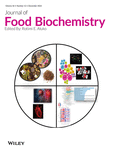Nasturtium officinale L. and metformin alleviate the estradiol- induced polycystic ovary syndrome with synergistic effects through modulation of Bax/Bcl-2/p53/caspase-3 signaling pathway and anti-inflammatory and anti-oxidative effects
Dawei Cui and Zhengzheng Xu contributed equally in this work.
Abstract
Polycystic ovary syndrome (PCOS) is one of the most common causes of infertility in women, which is associated with metabolic, hereditary and hormonal disorders. The aim of this study was to evaluate the therapeutic effects of Nasturtium officinale L. (N. officinale) on biochemical and molecular parameters in estradiol-induced PCOS in rats. Seventy Wistar rats in 7 groups (n = 10) were randomly assigned to normal (NC), PCOS, metformin (MET - 300 mg/kg), N. officinale (50 and 100 mg/kg) and co-treatment with MET and N. officinale groups. After 21 days of treatment, biochemical parameters levels of estrogen, LH and FSH along with serum levels of (IL-6 and IL-1β cytokines) and serum antioxidant parameters (enzymatic activity of catalase and superoxide dismutase) were measured. Finally, by measuring the expression of apoptosis related genes (Bax/Bcl-2/p53/caspase-3) with the help of real-time PCR and the expression of p53 with the help of immunohistochemistry in ovarian cells. N. officinale modulates hormones through its hypothalamic–pituitary-gonadal pathway with its synergistic effects along with MET. Also, in co-treatment groups (MET and N. officinale), the activity of serum antioxidant enzymes increased and also the serum level of inflammatory cytokines decreased. N. officinale, along with MET, amplified the Bax/Bcl2/p53/caspase-3 pathways, which eventually increased the number of p53 positive cells. These findings indicate that N. officinale extract along with MET can improve the physiological function of the ovaries in PCOS-induced disorders.
Practical applications
Polycystic ovary syndrome (PCOS) is one of the most common causes of infertility in women, which is associated with metabolic, hereditary and hormonal disorders. The extract of Nasturtium officinale L. was able to intensify mitochondrial apoptotic pathway in cystic follicles and prevent their formation. It seems that pro-drugs containing N. officinale along with effective commercial drugs in PCOS can help ovulation and fertility in woman with this disease.
CONFLICT OF INTEREST
The author declares that there is no conflict of interest that could be perceived as prejudicing the impartiality of the research reported.
Open Research
DATA AVAILABILITY STATEMENT
The data that support the findings of this study are available on request from the corresponding author. The data are not publicly available due to privacy or ethical restrictions.




